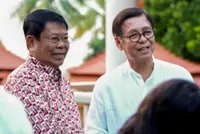BANGKOK: Thailand’s government teetered on the brink of collapse after a leaked audio recording of Prime Minister Paetongtarn Shinawatra criticising the country’s military provoked the withdrawal of support from a key party in her ruling coalition amid growing calls for her resignation.
The exit of the conservative Bhumjaithai Party, which holds 69 seats in the 500-member lower house, leaves the Pheu Thai Party-led government controlling just 261 seats in parliament, as more parties in the coalition held urgent meetings on Thursday (June 19) to decide whether to join the exodus.
Any further defections could tip the Paetongtarn administration into minority government; some political analysts have already written her position off as untenable.
Paetongtarn appeared to dig in during a hastily convened press conference on June 19, where she issued a public apology and urged the Thai people to unite in the face of what she described as a “threat to national security” after her phone conversation with Cambodian Senate President Hun Sen on June 15 surfaced online.
In the 17-minute call, which was uploaded to Hun’s Facebook page on June 18, Paetongtarn is heard urging the former Cambodian leader to help resolve a renewed outbreak of border tensions between the two South-east Asian nations that she said was proving damaging to her government.
Addressing Hun Sen, the father of current Cambodian Prime Minister Hun Manet, as “uncle”, she appeared to blame the Thai army for inflaming tensions and referred to them as “the opposite side”. She also urged Hun Sen to ignore comments from a firebrand Thai general whom she said merely wanted to “appear cool”. She said later that her words were merely part of a “negotiation tactic”.
“I must apologise for what happened as I really didn’t know the conversation was being recorded,” she said at the press conference, flanked by ministers and senior army commanders, adding that the call had been made from her private phone. “From now on, I’ll be more careful with my words.”
Paetongtarn said the Thai government had registered a diplomatic protest with Phnom Penh over the leak.
“No one would record such a personal conversation and release it like this. It is unacceptable,” she said.
While the situation remains fluid, political analysts said the scandal had shaken political trust and soured public sentiment towards an already unpopular leader to such an extent she was unlikely to survive as prime minister.
“It is the PM’s grave mistake to ignore the protocol by having a private phone call with Hun Sen on an unsecured line,” said Dr Panitan Wattanayagorn, a political scientist and former government adviser.
There were no good options remaining for Paetongtarn, Dr Panitan said. She could either step down to make way for another candidate to take over, or run the gauntlet of an early election by dissolving parliament, he said.
Coming just 10 months into her term, the potential for a fresh wave of political turmoil and leadership changes comes at an inopportune time, with Thailand battling to revive its stagnant economy while staving off the threat of US President Donald Trump’s trade tariffs.
Paetongtarn, the 38-year-old daughter of influential billionaire and former prime minister Thaksin Shinawatra, had not held any political office before becoming Thailand’s youngest prime minister in August 2024 after the removal of her predecessor by a court order.
She assumed power at the head of an uneasy post-election coalition with a clutch of pro-military parties, part of the conservative establishment whose distrust and rivalry with Thaksin’s political movement has dominated Thailand’s political landscape for much of the past two decades.
The fragile alliance had been under growing strain due to mounting legal pressure on Thaksin following his return from 15 years in self-imposed exile as well as factional infighting. The latter erupted into public view after an attempt by Pheu Thai to strip Bhumjaithai Party leader Anutin Charnvirakul of the interior minister position in a cabinet reshuffle.
Paetongtarn’s popularity had already been tested by pressure over her management of Thailand’s lacklustre economy, a resurgent opposition as well as long-held perceptions of the political influence her father, who has no official title but remains outspoken on policy matters, wields over her.
Pro-military voices had also seized on what they considered to be her overly gentle diplomatic approach to the territorial spat after a Cambodian soldier was killed during a brief exchange of gunfire at a disputed border area between the two countries on May 28, fanning nationalist sentiments on both sides.
Cambodia said on June 15 that it had formally submitted a request for the International Court of Justice to resolve its territorial row with Thailand after bilateral talks were inconclusive.
“This is by far the biggest crisis that Paetongtarn’s administration has faced,” said Dr Prinya Thaewanarumitkul, director of the Law Centre at Thammasat University.
“The Pheu Thai Party might still have had a chance to retain the stability of the government even after the Bhumjaithai Party left the coalition. But after the leaking of the Prime Minister’s conversation with Hun Sen, the situation is greatly worsened.”
Thailand’s armed forces have long played a prominent role in the country’s politics, with the kingdom experiencing a dozen military coups since the 1930s, including toppling the governments of both Thaksin and his sister Yingluck Shinawatra in 2006 and 2014 respectively.
The centre-left main opposition People’s Party said Ms Paetongtarn had “completely lost” the confidence of the people by portraying the Thai army as the enemy. Opposition leader Natthaphong Ruengpanyawut called on her to dissolve parliament to take responsibility for the damage caused and stave off any potential repeat of a military coup.
“While current public sentiment may lead to the setting up of pressure groups to gather in front of Government House or other places, people should be reminded that a military coup is not the answer,” he said on June 19.
“We must not let emotions push society beyond the bounds of democracy.” - The Straits Times/ANN





